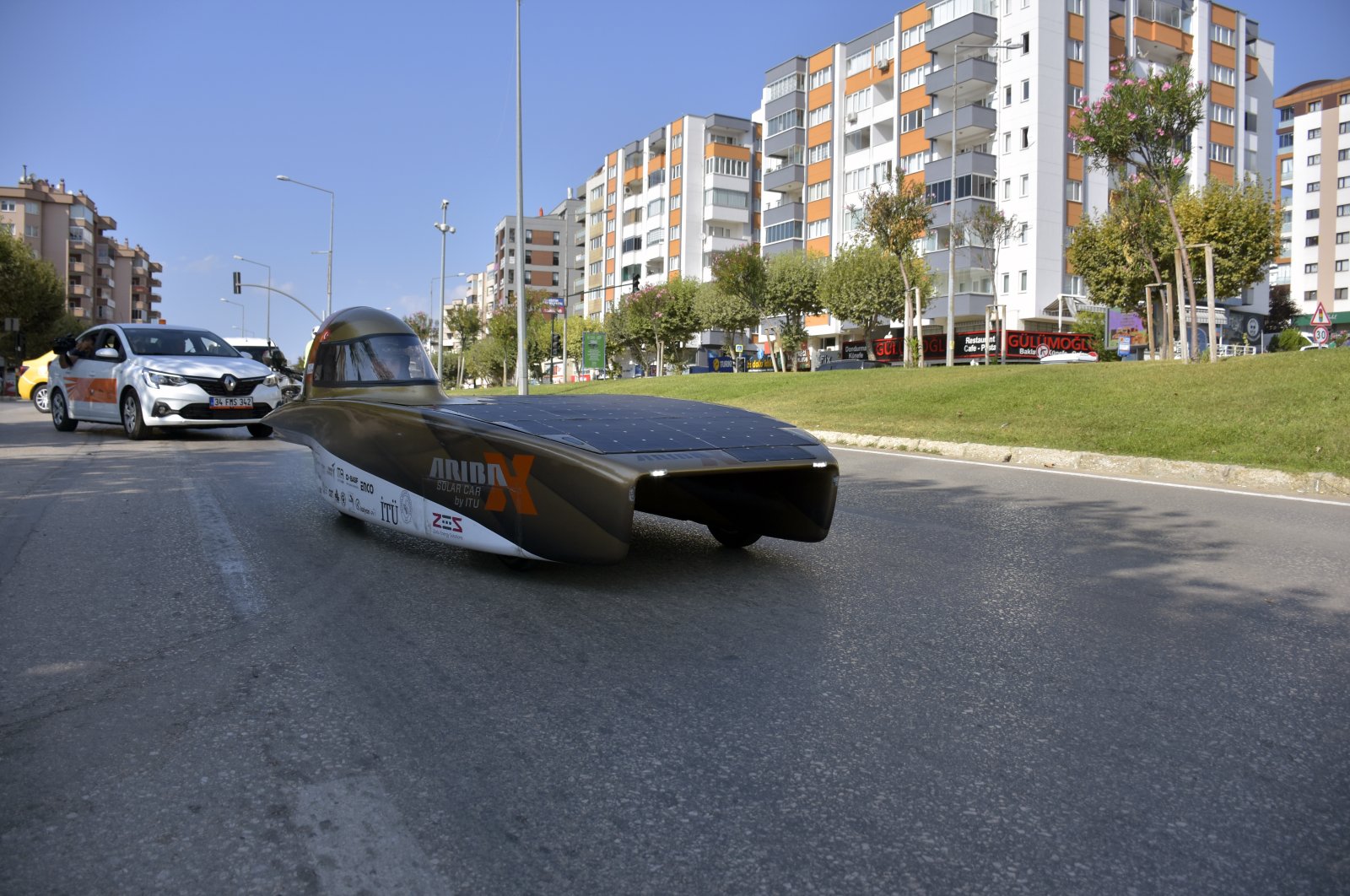Solar-powered Turkish vehicle hits the road for national tour
Ahead of a trip to Belgium to join a competition, ARIBA ZES X, a solar-powered vehicle developed by a team from Istanbul Technical University (ITÜ), started a tour of the country. The tour, which will end on Aug. 12, sees the car traveling from Istanbul to the capital Ankara, stopping over in the cities of Bursa, Eskişehir and Konya for a journey covering 1,300 kilometers (810 miles).
The team has produced 10 different solar-powered cars so far and is now sponsored by an energy company. Their tour aims to demonstrate that vehicles can operate without harming the environment, according to the developers. Along the route, they will hold several events to promote the car and the use of renewable energy for vehicles. In September, the car will be showcased at the European Solar Challenge in Belgium, a 24-hour endurance race for solar cars across the world in which they compete on a former Formula One track.
Ufuk Çay, captain of the solar car crew, says the vehicle is “80%” locally made and contains a high ratio of carbon fiber. Çay told reporters in the northwestern province of Bursa where ARIBA (whose name is derived from Turkish words for “bee” and “car”) drove through a busy thoroughfare.
The latest ARIBA model can reach a speed of 140 kph and weighs only about 160 kilograms (350 pounds). “We won titles in previous solar car challenges and hope to repeat our success,” Çay says. He said they were striving to build cars compatible with road standards for other types of vehicles. “Its battery capacity is good enough for driving for about 400 kilometers. When fully exposed to sunlight, it can travel with an average of 70 kph without battery consumption,” he said.
The ITÜ Solar Car Team was established in 2004 as one of the first initiatives for solar-powered vehicle development. It wrapped up the production of its first car, ARIBA, in 2005, one year before a new model of the car was developed. Both cars dominated a 2006 Formula G race in Türkiye for solar cars. They kept accumulating awards in other solar car races in the country in the following years, before going international at World Solar Challenge in 2009.
In 2015, the team produced the country’s first four-seat solar car called “Aruna” and in 2016, it received the Brain Sport Award at European Solar Challenge. In 2018, the team’s ARIBA 8 hit the road for its first Türkiye tour, visiting Çanakkale, Bursa, Eskişehir and Ankara.
Vehicles are increasingly turning to renewable energy resources, solar power in particular, especially in light of climate change. Türkiye also boosted its shift to solar power, increasing its installed solar power over the last decade, with renewable investments expected to accelerate in the period ahead. The aim to generate a larger share of power from renewable sources stems from the country’s goal of lowering its hefty energy bill, as it imports almost all of its energy needs from abroad. Its journey of producing energy from solar power started at just 40 megawatts (MW) back in 2014. It has now reached 7,816 megawatts, according to data compiled from the Energy and Natural Resources Ministry. Türkiye’s multiple support schemes throughout the years saw the installed solar power capacity rise to 249 MW in 2015, before rocketing to 833 MW a year later. Still, the biggest leap was seen in 2017, when the figure reached 3,421 MW, a 311% year-over-year increase, according to the data. Some 1,149 MW of installed capacity was added in 2021 alone. Türkiye’s renewable energy capacity is predicted to grow by over 50% through 2026, according to the International Energy Agency (IEA).
Though mass use of solar cars still remains a distant goal, electric cars remain the most viable alternative to gas-guzzling, polluting vehicles. Electric car sales in Türkiye increased by 243.9% to 1,073 units in the January-March period of this year compared to the same period last year, while hybrid automobile sales decreased by 17.1% to 11,227. The total sales of automobiles and light commercial vehicles in Türkiye decreased by 23.5% in the January-March period of 2022 and amounted to 152,050, according to data from the Automotive Distributors Association (ODD).
Türkiye also continues its efforts toward electric car transformation. Most recently, the procedures and principles regarding the establishment of charging units and stations, the operation of the charging network and the stations connected to the charging network, and the provision of charging services were revealed. Industry and Technology Minister Mustafa Varank recently said that the ministry started a TL 300 million ($20.33 million) grant support program for the establishment of more than 1,500 high-speed charging stations all over Türkiye.




